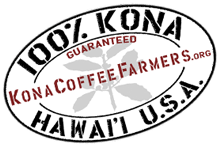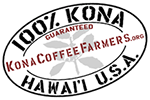In a federal court class action lawsuit, Kona coffee farmers have recovered more than $15 million in settlement payments from companies accused of marketing fraudulent Kona coffee. More effective than lawsuits, however, would be active enforcement of fair labeling laws by the FDA. What ideas do you have to accomplish that?
In order to combat deceptive labeling practices, we can update and amend the Federal Food, Drug, and Cosmetic Act (FD&C Act) and the Fair Packaging and Labeling Act requiring specificity of a products origin percentage. This would require that manufacturers clearly state on their packaging precisely where the product was grown and processed – and how much. When deceptive products are sold and purchased, they steal from our local farmers. Kona coffee is world-renowned for it’s distinctive flavor and aroma. It’s distinctive characteristics come only from the Kona districts of the Big Island. Many folks who aren’t in the business do not know that the typical Kona coffee farmer cultivates five acres of land or less and are family-run businesses. We must protect Hawaii’s small farmers.
In recent years invasive species such as Coffee Berry Borer, Coffee Leaf Rust, and Avocado Lace Bug have been introduced into Hawaii and are drastically reducing the income of farmers. What can you do to bring federal funds or subsidies directly to farmers to combat these destructive new agricultural pests?
Recently the USDA allocated over $1.3 million to Hawaii to strengthen surveillance, detection and identification of pests. This will help protect Hawaii’s agricultural industry from invasive pests, however it addresses the situation after the fact – before the pests arrive. In 1998 USDA outlawed importing un-roasted, green coffee to protect Hawaii from the coffee berry borer and coffee leaf rust. However at the local level, the Hawaii Department of Agriculture policy is inconsistent with the USDA. In order to maintain the health of Hawaii’s coffee crops, there must be parity between state and federal law. As your representative one of my responsibilities is to think ahead and be proactive. Hawaii’s law needs to match Federal law.
When we fly to the mainland, USDA agents scan luggage and remove fruits, vegetables and other plant material to prevent damage to mainland farms. When we fly into Hawaii, there is a voluntary disclosure system and “Amnesty Bins”–and no involvement on the part of the USDA. What are your ideas on how to bring the same type of USDA protections to Hawaii farmers as provided to mainland farmers?
To increase protections of Hawaii’s farmers and crops, the Hawaii Department of Agriculture and the USDA regulations should be reciprocal. Currently when traveling from the US Mainland to Hawaii agriculture screening is self-declared on a form, unlike traveling form Hawaii to the US Mainland where all agricultural items must be screened. There should be the same care taken to protect Hawaii as we do to protect the US Mainland.
Please close by telling us a bit more about yourself and your commitment to agriculture. Mahalo!
I’ve been meeting with community leaders in the agriculture and farming industry. What I am hearing is a need to improve the sustainability of family farmers and to improve food security for Hawaii’s communities. My goal in working with community leaders and the boots-on-the-ground farmers is to formulate and promote policies which help farmers, statewide, become more competitive in the marketplace. In order for Hawaii agriculture to thrive, we need to make sure the playing field is clear of obstacles. Another passion is to foster and encourage new technologies to aid and grow Hawaii’s agriculture industry; like hyro-nets, industrial hemp and other effective models in research and development. I am also focussed on working with small farmers to aid in accessing and pooling resources and working together as an industry. The more self-sustaining Hawaii’s farms are the stronger our food security becomes. My prime personal goal is to keep a pulse on what’s really going on and be ready to act. We want Hawaii’s people to not only survive, but prosper and thrive.

